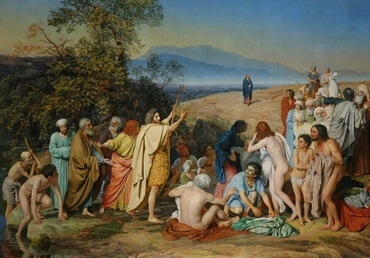John第1章:15
这节经文评论
原作者: Brian David

When Jesus was being tested in the wilderness, He quoted Scripture to push away temptation. When He rode a donkey’s colt into Jerusalem, He did it to fulfill prophecy. When He offered the Two Great Commandments, he said that on them "hang all the Law and the Prophets." And in Luke 24, after His death and rising, he appeared to the disciples and "expounded unto them in all the scriptures the things concerning himself." He did not cast aside the Word as it then existed, to be replaced by the new things He was teaching. He opened it up to show the true meaning inside – a meaning in full accord with the things He was teaching.
That is illustrated in this verse. John the Baptist represents the external, literal meaning of the Old Testament; to "witness" means to confirm that something is good by looking at things we know to be true. And the Old Testament did confirm Jesus as the Lord! In fact, the Writings tell us that at its deepest level the Old Testament is entirely an unveiling of the Lord’s loving nature, which puts "this was He of whom I spake" in a brilliant and beautiful light. The Word had been telling people about the Lord all along, if only they had understood.
The statement that Jesus came "before" John seems odd. We know that John was about six months older, and that he was preaching before Jesus; how was Jesus "before" him? The answer is that Jesus was the embodiment of the Lord’s divine truth, the pure expression of the Lord’s love. The Lord’s love is from eternity to eternity, unchanging, and so its expression – divine truth – is also from eternity to eternity, unchanging. Jesus was a new form for that truth, a new way of sharing it with humanity, but His essence had always been and would always be. The Old Testament – represented by John -- was created from that divine truth as a container, so the divine truth certainly came before it.
©2024 New Christian Bible Study Corporation. All rights reserved. Printed from newchristianbiblestudy.org




